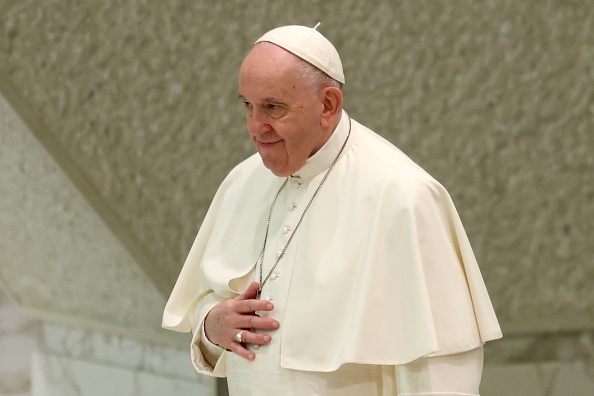Juba – Pope Francis is making a long-awaited “peace pilgrimage” to conflict-torn South Sudan, but whether his plea for reconciliation is heard by the country’s battle-hardened leaders remains an open question.
It is the first visit by a pope since the mostly Christian south achieved independence in 2011 following a decades-long struggle against Muslim-majority Sudan that was sometimes cast as a religious war.
But statehood has not brought peace to the world’s newest country, and Francis arrives on Friday in a nation mired in violence.
President Salva Kiir and his deputy Riek Machar are no strangers to the papacy, as they were implored by Francis to silence their guns after a civil war that left 380 000 dead and the young country in ruins.
In jaw-dropping scenes at the Vatican in 2019, Francis knelt before Kiir and Machar and kissed the feet of two foes whose personal armies had been accused of horrific war crimes.
ALSO READ | Hymns, hopes and prayer: South Sudan pins dream of peace on pope’s visit
“Your people today are yearning for a better future, which can only come about through reconciliation and peace,” Francis told the rival leaders, who stood stunned by the gesture.
Four years later, South Sudan’s civil war may be technically over, but armed conflict stoked by political elites and their proxies has only escalated the bloodshed and suffering that Francis sought to end.
“People are still being killed, all across the country,” Ferenc David Marko, a researcher at the International Crisis Group (ICG) think tank, told AFP.
“If you see how widespread the violence is… you can claim that actually things are worse than they were at the peak of the conflict.”
‘A turning point’
Some with a front row seat to South Sudan’s perennial chaos hope the 86-year-old pontiff can breathe life back into a neglected peace process that has barely moved since that extraordinary moment in Rome.
“I want to believe that this visit will be the turning point,” Father James Oyet Latansio, the general secretary of the South Sudan Council of Churches, told AFP.
The international community, which fears the country’s fragile transition could collapse entirely this year if it’s ignored any longer, hopes Francis has better luck getting the message across.
“He’s also in a unique capacity to, I think, engage with the leadership of the country and what is required for the country to experience lasting peace,” Nicholas Haysom, the UN special envoy to South Sudan, told reporters in January.
ALSO READ | Pope Francis to visit DRC and South Sudan in early 2023
Amnesy International urged Francis to press South Sudan’s leaders to prosecute those responsible for war-time atrocities, and deliver justice as they promised under the peace agreement.
Observers said the high-profile visit would underscore the difficult work done by the church on the ground in areas where there are no government services and aid workers are often attacked or killed.
It would also turn the spotlight on suffering in a country where nine million people — three-quarters of the entire population — need charity, and remind those in desperate straits that they are not forgotten.
“This visit will show that everything is possible. Change is possible, and transformation is possible,” Latansio said.
The church in South Sudan is broad in character, and Francis will be joined on his three-day visit by Justin Welby, the Archbishop of Canterbury, and the Moderator of the General Assembly of the Church of Scotland, Iain Greenshields.
Moral authority
Church leaders have “tremendous credibility and moral authority” in devout South Sudan, said John Ashworth, a retired missionary with over 40 years’ experience in Sudan and South Sudan.
During the darkest moments of the liberation wars, the church negotiated peace and fed, protected and healed civilians on all sides, in the total absence of government or international assistance.
“The only institution which remained on the ground with the people was the church,” Ashworth told AFP.
When civil war erupted in 2013, the clergy again defended civilians and spoke out against brutality, taking great risk in a country with little space for critical voices.
But churches sheltering civilians were attacked and priests murdered, in a “shocking” turn against a sacrosanct institution, said Christopher Tounsel, associate professor of history at the University of Washington and a scholar of Christianity in South Sudan.
ALSO READ | Pope visits conflict-ridden central Africa, first stop DRC
Church leaders were also excluded from peace talks, diminishing their political influence and historic role as trusted peacemakers.
“The church is still a voice to be respected,” said Ashworth, “but it is not as respected as it was.”
Some observers believe Francis stands a better chance than most at getting through to Kiir, a devout Catholic and churchgoer who was deeply moved by the intervention at the Vatican.
But analysts said the president was looking inwards, preoccupied with consolidating power and outmanoeuvring rivals, while Machar’s ranks were splintered and warring — a complex situation for any diplomat to navigate.
“I wonder how much of an impact Pope Francis’ visit will actually make in terms of spurring actual real change, or if it will just be a more symbolic trip,” Tounsel told AFP.
Follow African Insider on Facebook, Twitter and Instagram
Source: AFP
Picture: Getty Images
For more African news, visit Africaninsider.com


